
Beit Shemesh is a city located approximately 30 kilometres (19 mi) west of Jerusalem in Israel's Jerusalem District. A center of Haredi Judaism, Beit Shemesh has a population of 170,683 as of 2024.
The Synagogue Council of America was an American Jewish organization of synagogue and rabbinical associations, founded in 1926. The Council was the umbrella body bridging the three primary religious movements within Judaism in the United States. It included:

Reform Judaism, formally the Movement for Reform Judaism (MRJ) and known as Reform Synagogues of Great Britain until 2005, is one of the two World Union for Progressive Judaism–affiliated denominations in the United Kingdom. Reform is relatively traditional in comparison with its smaller counterpart, Liberal Judaism, though it does not regard Jewish law as binding. As of 2010, it was the second-largest Jewish religious group in the United Kingdom, with 19.4% of synagogue-member households. On 17 April 2023, Reform Judaism and Liberal Judaism announced their intention to merge as one single unified progressive Jewish movement. The new movement, which may be called Progressive Judaism, will represent about 30% of British Jewry who are affiliated to synagogues.

The Great Synagogue of Warsaw was a former Reform Jewish congregation and synagogue, that was located on Tłomackie street, in Warsaw, in the Masovian Voivodeship of Poland. Designed by Leandro Marconi and completed in the Neoclassical style in 1878, at the time of its opening, it was the largest Jewish house of worship in the world. The grand synagogue served as a house of prayer until World War II when it was destroyed by Nazis on May 16, 1943.

The Beit Warszawa Synagogue is a Reform Jewish congregation and synagogue, located at 113 Wiertnicza Street, in the district of Wilanów, Warsaw, in the Masovian Voivodeship of Poland. Designed in the Modernist style and completed in 2003, the synagogue has regular events, including Friday night and Saturday morning prayers. Beit Warszawa is a member of Beit Polska, the umbrella organization for the Progressive and Reform Jewish community in Poland.

The Chachmei Lublin Yeshiva Synagogue is a Hasidic Jewish congregation, synagogue, and yeshiva, located at 85 Lubartowska Street, in Lublin, in the Lublin Voivodeship of Poland.
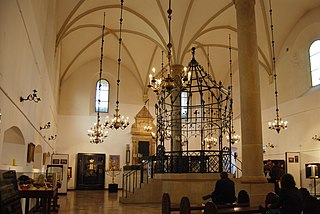
The synagogues of Kraków are a collection of monuments of Jewish sacred architecture in Poland. The seven main synagogues of the Jewish District of Kazimierz constitute the largest such complex in Europe next to Prague. These are:
- The Old Synagogue
- Wolf Popper Synagogue
- Remah Synagogue
- High Synagogue
- Izaak Synagogue
- Temple Synagogue
- Kupa Synagogue
The history of the Jews in Kyrgyzstan is linked directly to the history of the Bukharan Jews of Uzbekistan. Until the 20th century, most Jews living in the Kyrgyz areas were of the Bukharian Jewish community. However, during the 20th century, large amounts of European Jews began to emigrate to Kyrgyzstan which was then part of the Soviet Union, and a small amount of them still live in the country.
Lesbian, gay, bisexual, transgender (LGBT) affirming denominations in Judaism are Jewish religious groups that welcome LGBT members and do not consider homosexuality to be a sin. They include both entire Jewish denominations, as well as individual synagogues. Some are composed mainly of non-LGBT members and also have specific programs to welcome LGBT people, while others are composed mainly of LGBT members.

Bromley Reform Synagogue is a Reform Jewish congregation and synagogue, located at 28 Highland Road, in Shortlands, Bromley, in the Borough of Bromley, London, England, in the United Kingdom.
The Jewish Community of Gdańsk dates back to at least the 15th century though for many centuries it was separated from the rest of the city. Under Polish rule, Jews acquired limited rights in the city in the 16th and 17th centuries and after the city's 1793 incorporation into Prussia the community largely assimilated to German culture. In the 1920s, during the period of the Free City of Danzig, the number of Jews increased significantly and the city acted as a transit point for Jews leaving Eastern Europe for the United States and Canada. Antisemitism existed among German nationalists and the persecution of Jews in the Free City intensified after the Nazis came to power in 1933. During World War II and the Holocaust the majority of the community either emigrated or were murdered. Since the fall of communism Jewish property has been returned to the community, and an annual festival, the Baltic Days of Jewish Culture, has taken place since 1999.

The Hamburg Temple is a former Reform Jewish congregation and synagogue, located in Hamburg, Germany. The congregation was the first permanent Reform Jewish community and the first to have a Reform prayer rite. It operated from 1818 to 1938. On 18 October 1818 the Temple was inaugurated and later twice moved to new edifices, in 1844 and 1931, respectively. The congregation abandoned the synagogue in 1938.
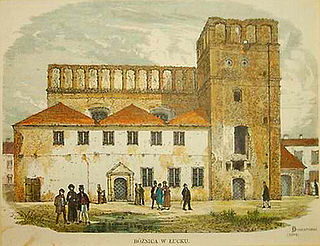
The Great Synagogue is a former Orthodox Jewish synagogue, located at 33 Karaimska Street, in the Jewish quarter of Lutsk, in Volynska Oblast, Ukraine. The congregation worshipped in the Ashkenazi rite.

The Union of Jewish Religious Communities in Poland, is a religious association formed by Jews living in Poland who adhere to Judaism. It was originally created in 1949 as the Religious Association of Judaism, and renamed in 1992. The Association's seat is located in Warsaw, with seven administrative branches throughout the country. ZGWŻ consists of approximately 2,000 members (1998) congregating in nine municipalities. The Union operates seven active synagogues and 15 prayer houses. Also, ZGWŻ publishes its own periodicals, as well as the popular Jewish Calendar. Since 2003, the president of the Union is Piotr Kadlčik.
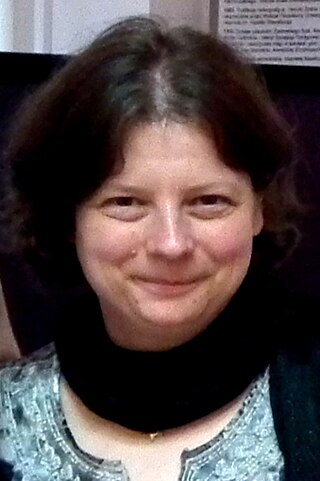
Miriam Gonczarska is a Jewish spiritual leader who in 2015 received her Semikhah as the first European, and in the same time the first Polish, maharat.
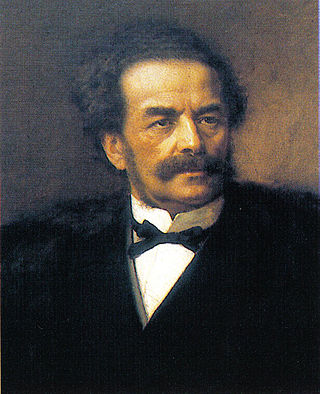
Leopold Stanisław Kronenberg was a Polish banker, investor, and financier, and a leader of the 1863 January uprising against the Russian Empire.
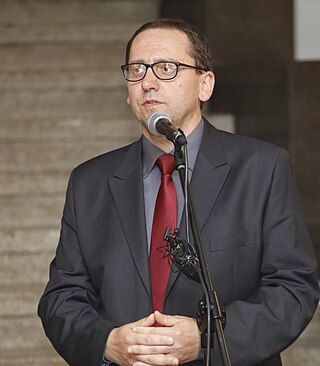
Jacek Józef Proszyk is a Polish historian and religions scholar. He specializes in the history of Jews and Protestants and in the history of southern Poland and Czech Silesia.
Beit Emanuel is a progressive synagogue located in Parktown, Johannesburg. The synagogue was established in 1954 and is one of the largest progressive Jewish congregations in South Africa. It is an affiliate of the South African Union for Progressive Judaism (SAUPJ), which is part of the World Union for Progressive Judaism (WUPJ).
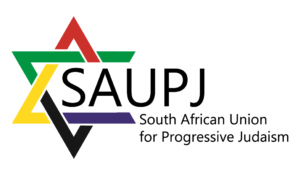
The South African Union for Progressive Judaism (SAUPJ) is an affiliate of the World Union for Progressive Judaism and supports 11 progressive congregations. Rabbi Moses Cyrus Weiler, a founder of Reform Judaism in the country, led the country's first Reform synagogue, Temple Israel in Hillbrow, Johannesburg. Weiler is credited with growing the movement, to represent 15-17% of South African Jewry and establishing 25 congregations in the country. A 2020 joint study by the Institute for Jewish Policy Research and the University of Cape Town showed that 12% of Jews identified as Progressive and that in relative terms the progressive strands are increasing after falling to 7% in 1998 and 2005 studies. In Johannesburg, the community accounts for 7% of the city's Jewry, rising to 18% in Cape Town and 25% in Durban.














